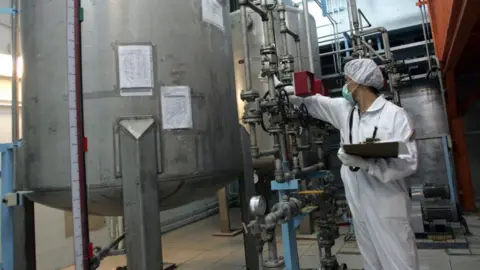US to hold direct nuclear talks with Iran, Trump says
The US and Iran will hold "direct talks" over a possible new nuclear deal on Saturday, says President Donald Trump.
Hours after the surprise announcement, Iran's foreign minister said the talks in Oman would be "indirect" but could be "as much an opportunity as... a test".
Trump - who pulled the US out a 2015 nuclear deal between Iran and world powers during his first term - said discussions would be at "very high level" and that Iran would be in "great danger" if talks were not successful.
Last month, Iran said it was open to the possibility of indirect talks after Trump said he wanted a deal to prevent Iran from acquiring nuclear weapons and avert possible US military action.
Trump disclosed the talks after a White House meeting with Israel's Prime Minister Benjamin Netanyahu, who has also threatened to strike Iranian nuclear sites.
Iran insists its nuclear activities are entirely peaceful, but it has increasingly breached the restrictions imposed by the existing deal in retaliation of the crippling US sanctions reinstated seven years ago. Iran has also stockpiled enough enriched uranium to make several bombs.
Speaking in the Oval Office on Monday, Trump said: "We're having direct talks with Iran and they've started, it'll go on Saturday. We have a very big meeting and we'll see what can happen."
"I think everybody agrees that doing a deal would be preferable to doing the obvious. And the obvious is not something that I want to be involved with, or frankly that Israel wants to be involved with, if they can avoid it."
"But it's getting to be very dangerous territory, and hopefully those talks will be successful."
Trump later added: "Iran cannot have a nuclear weapon, and if the talks aren't successful, I actually think it'll be a very bad day for Iran."
Hours later, Iranian Foreign Minister Abbas Araghchi said "indirect high-level talks" would take place on Saturday in Oman.
"It is as much an opportunity as it is a test. The ball is in America's court," he wrote on X.
On Tuesday morning, Iran's hard-line Tasnim news agency reported that Araghchi and Trump's Middle East special envoy Steve Witkoff would "meet each other indirectly".
Netanyahu said Israel and the US were "both united in the goal that Iran does not ever get nuclear weapons".
"If it can be done diplomatically in a full way, the way it was done in Libya. I think that would be a good thing," he added, referring to the North African country's decision to dismantle its nuclear, biological and chemical weapons programmes in 2003.
 Getty Images
Getty ImagesThe announcement of talks marks a significant step forward, but they are certain to be long and difficult.
The US and Iran have long been foes and they have not had diplomatic relations since the Islamic Revolution in 1979 and the seizure of the US embassy in Tehran.
In March, Trump sent a letter to Iran via an intermediary from the United Arab Emirates setting out his willingness to discuss a deal.
On the day that the letter was delivered, Iran's Supreme Leader Ayatollah Ali Khamenei dismissed it as a "deception of public opinion" and rejected the idea of negotiations.
But at the end of the month, Iran's president said Khamenei had sent a reply to Trump's letter via Oman that left open the possibility of indirect talks.
"We don't avoid talks; it's the breach of promises that has caused issues for us so far," Massoud Pezeshkian told a cabinet meeting. "They must prove that they can build trust."
The contents of the two letters have not been made public, and US officials have revealed few details about Trump's demands.
After Witkoff said in an interview that Trump was proposing a "verification programme" to show Iran is not pursuing nuclear weapons, National Security Adviser Mike Waltz clarified that the goal was "full dismantlement".
A senior official at Iran's foreign ministry told BBC Persian on Tuesday that it would never agree to dismantle its nuclear programme, and that the "Libya model" would never be part of any future negotiations.
Curbing Iran's ability to build nuclear weapons has been a key foreign policy goal for the US and its allies for decades.
Suspicions that Iran was using its nuclear programme as a cover to develop a bomb prompted the US, EU and UN to impose crippling sanctions in 2010.
The 2015 deal that Iran reached with then-US President Barack Obama's administration, as well as the UK, France, China, Russia and Germany, saw it limit its nuclear activities and allow inspectors from the International Atomic Energy Agency (IAEA) into the country in return for sanctions relief.
However, in 2018, Trump unilaterally abandoned the deal, which he said did too little to stop Iran's potential pathway to a bomb.
In response to the US sanctions reinstated to pressure it to renegotiate, Iran increasingly breached its restrictions, particularly those limiting the production of enriched uranium, which can be used to produce fuel for nuclear power plants but also to build nuclear weapons.
The IAEA warned in February that Iran had stockpiled almost 275kg (606lb) of uranium enriched to 60% purity, which is near weapons grade. That would theoretically be enough, if enriched to 90%, for six nuclear bombs.
Israel, which is assumed to have its own nuclear weapons but maintains an official policy of deliberate ambiguity, views a nuclear Iran as an existential threat.
Last year, Israel said it had hit an Iranian nuclear site in retaliation for an Iranian missile attack on Israel, as well as air defences systems and missile manufacturing facilities.
Iran can also no longer rely on the threat of deterrence from its regional allies Hamas and Hezbollah, which have been devastated by wars with Israel over the past 18 months.
